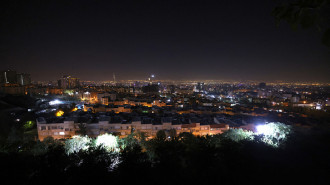UAE-Israeli normalisation deal 'allows Jewish worshippers to pray' at Al-Aqsa compound: report
The wording of a joint statement agreed by US President Donald Trump, Israeli Prime Minister Benjamin Netanyahu and the Crown Prince of Abu Dhabi Sheikh Mohammed bin Zayed implied that non-Muslims can pray at the Al-Aqsa compound, a report by Terrestrial Jerusalem said, despite the UAE having no authority over Islam's third holiest site.
The statement, which was condemned by Palestinians, stated: "All Muslims who come in peace may visit and pray at the Al-Aqsa Mosque, and Jerusalem's other holy sites should remain open for peaceful worshippers of all faiths."
Terrestrial Jerusalem, which tracks political developments in Jerusalem that could spark violence or impact political processes, said that the terminology used in the statement was an intentional attempt to open Al-Aqsa compound - also known as Temple Mount, for Jewish prayers and change its current status.
Twitter Post
|
"It is not too late to insist that this wording be removed and that there be a renewed commitment, unambiguous in its clarity, by both Israel and the United States to the traditional interpretation of the status quo, and specifically regarding Jewish prayer on the Mount," the report suggested.
Following the 1967 war, Israel and Jordan - the custodian of Al-Aqsa mosque - agreed that Jews would be given the right to peacefully visit the compound but would not be allowed to pray there.
The Western Wall was to remain the Jewish place of prayer in Jerusalem.
Israel's agreement to establish diplomatic ties with the UAE marks a watershed moment in its relations with Arab countries, but the Palestinians say it puts a just resolution to the Middle East conflict even farther out of reach.
The UAE presented its decision to upgrade longstanding ties to Israel last month as a way of encouraging peace efforts by taking Israel's planned annexation of parts of the occupied West Bank off the table, something Israeli Prime Minister Benjamin Netanyahu swiftly rebuffed by insisting the pause was "temporary".
The deal was met with condemnation from Palestinians and their leadership, who have dismissed it as tantamount to "treason" and "a stab in the back".
Follow us on Facebook, Twitter and Instagram to stay connected

![Palestinians mourned the victims of an Israeli strike on Deir al-Balah [Getty]](/sites/default/files/styles/image_684x385/public/2024-11/GettyImages-2182362043.jpg?h=199d8c1f&itok=xSHZFbmc)


![The law could be enforced against teachers without prior notice [Getty]](/sites/default/files/styles/image_684x385/public/2178740715.jpeg?h=a5f2f23a&itok=hnqrCS4x)
 Follow the Middle East's top stories in English at The New Arab on Google News
Follow the Middle East's top stories in English at The New Arab on Google News
![Thousands of people have fled from Lebanon to Syria as a result of Israel's war [Getty]](/sites/default/files/styles/image_330x185/public/2024-11/GettyImages-2180619380.jpg?h=199d8c1f&itok=q4PK1BtW)

![Anwar Ibrahim (centre) said that Malaysia would support the Palestinian people against Israel's genocide [Getty]](/sites/default/files/styles/image_330x185/public/2024-11/GettyImages-1742690206.jpg?h=69f2b9d0&itok=ZYgNyRPM)